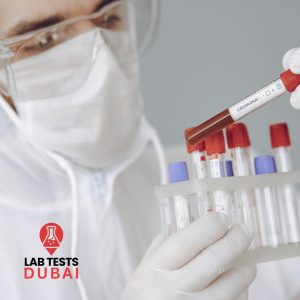
High-Affinity Anti-Yersinia Antibodies for Reliable Detection & Research
1.050,00 د.إ
Anti-Yersinia Antibodies are highly specific immunological tools designed for the detection and study of Yersinia species, including Y. pestis, Y. enterocolitica, and Y. pseudotuberculosis. These antibodies offer exceptional sensitivity and specificity, making them ideal for diagnostic applications, research, and pathogen surveillance.
Sample Type : Serum
Methodology : Agglutination or complement fixation reaction
TAT : 20-28 Days
Description
Anti-Yersinia Antibodies Test – Accurate Detection of Bacterial Infection & Immune Complications
The Anti-Yersinia Antibodies Test from Lab Tests Dubai is a specialized blood test that detects IgG and IgM antibodiesagainst Yersinia enterocolitica and Yersinia pseudotuberculosis—bacteria commonly transmitted through contaminated food or water, especially undercooked pork, unpasteurized milk, or poor hygiene.
While most gastrointestinal infections resolve on their own, Yersinia can cause:
- Severe enterocolitis mimicking appendicitis
- Reactive arthritis (joint pain after infection)
- Erythema nodosum (painful skin nodules)
- Systemic infection in immunocompromised individuals
This test is essential for:
- Diagnosing persistent diarrhea or abdominal pain after foodborne illness
- Evaluating joint pain or swelling following GI infection
- Investigating fever of unknown origin with GI symptoms
- Supporting diagnosis in patients with autoimmune-like symptoms (e.g., HLA-B27+ individuals)
Using agglutination or complement fixation methodology, this serum-based test detects immune response when stool cultures are negative or delayed, helping gastroenterologists and rheumatologists uncover hidden infections.
Available with home blood collection, Lab Tests Dubai ensures accurate, private, and stress-free testing—so you can get answers after a stubborn illness.
Why You Need This Test
If you’ve had severe food poisoning, ongoing stomach pain, or joint pain after diarrhea, this test could reveal a bacterial trigger behind your symptoms.
You need the Anti-Yersinia Antibodies Test if:
- You had bloody or prolonged diarrhea after eating undercooked meat
- You suffer from right lower abdominal pain (mimicking appendicitis)
- You developed joint pain, swelling, or stiffness weeks after a GI illness
- You have skin nodules (erythema nodosum) or uveitis
- You’re being evaluated for reactive arthritis or seronegative spondyloarthropathy
- You work with pigs, raw meat, or in food processing
This test helps:
- Confirm past Yersinia infection when culture is negative
- Link GI illness to joint symptoms
- Guide antibiotic or anti-inflammatory treatment
- Rule out other causes of chronic abdominal pain
Early detection = faster recovery and prevention of long-term complications.
Symptoms That Indicate This Test
Consider the Yersinia Antibody Test if you experience:
✅ For Gastrointestinal Infection:
- Watery or bloody diarrhea (often >7 days)
- Fever, nausea, vomiting
- Pain in right lower abdomen (mistaken for appendicitis)
- Weight loss or malaise
✅ For Post-Infectious Complications:
- Joint pain (knees, ankles, spine) – reactive arthritis
- Red, painful skin nodules – erythema nodosum
- Eye inflammation (uveitis) or urethritis
✅ For High-Risk Individuals:
- Consumers of raw/undercooked pork or pig’s blood
- Farmers, butchers, or food handlers
- Immunocompromised patients
These signs may point to Yersinia infection—and this test helps start the diagnostic journey.
Natural Production: How Antibodies Reveal Past Infection
Yersinia enterocolitica spreads through:
- Contaminated food (especially undercooked pork, chitterlings)
- Unpasteurized milk or water
- Fecal-oral route (poor hand hygiene)
After infection:
- The immune system produces IgM antibodies within 1–2 weeks
- IgG antibodies rise after 2–3 weeks and persist for months
- Even after recovery, antibodies can remain detectable
Key Facts:
- Stool culture is gold standard but often negative by the time symptoms are evaluated
- Serology (antibody testing) is useful for retrospective diagnosis
- High IgG titers support recent or past infection
- Linked to HLA-B27-positive reactive arthritis (like Reiter’s syndrome)
This test is best used 2–4 weeks after symptom onset for optimal antibody detection.
What Happens If Untreated? Risks of Ignoring Yersinia Infection
Ignoring a Yersinia infection can lead to:
⚠️ Reactive Arthritis – chronic joint pain and stiffness
⚠️ Erythema Nodosum – painful skin inflammation
⚠️ Bacteremia or Abscesses – in liver, spleen, or lungs
⚠️ Sepsis – in immunocompromised or elderly patients
⚠️ Misdiagnosis as IBD or Appendicitis – leading to unnecessary surgery
The good news? Most cases are self-limiting, but:
- Severe or systemic infections require antibiotics (e.g., ciprofloxacin, trimethoprim-sulfamethoxazole)
- Reactive arthritis may need NSAIDs or DMARDs
- Hydration and electrolyte support are crucial
Early testing = prevention of post-infectious complications.
How to Prepare for the Test
To ensure accurate results:
✅ No fasting required
✅ Continue your regular medications—but inform your doctor
✅ Wait 2–4 weeks after symptom onset for optimal antibody levels
✅ Inform your doctor of:
- Recent food history (pork, unpasteurized dairy)
- Duration of diarrhea or joint pain
- History of autoimmune or GI conditions
A serum blood sample is collected via standard draw—available at our labs or via home collection.
Test Overview: Agglutination / Complement Fixation Method
Interpretation:
- Negative → No evidence of recent infection
- IgM Positive → Suggests recent infection
- IgG Positive → Indicates past or ongoing infection
- High Titer → Supports clinical diagnosis
Note: Not for acute diagnosis. Best for post-infectious evaluation.
Benefits of the Yersinia Antibody Test
🔹 Diagnose Hidden Foodborne Illness
Identify infection after negative stool tests.
🔹 Link Gut to Joint Pain
Support diagnosis of reactive arthritis.
🔹 Avoid Misdiagnosis
Differentiate from IBD, appendicitis, or autoimmune disease.
🔹 Guide Treatment
Justify antibiotics or rheumatology referral.
🔹 Peace of Mind
Know if your symptoms are infection-related.
If you’re tired of ongoing diarrhea, joint pain, or unexplained fever, the Anti-Yersinia Antibodies Testgives you the answers you need in 28 days.




Reviews
There are no reviews yet.